Sports
Shehroze Kashif vies with competitors, seeks funds to scale summits
Published
3 years agoon
By

Shehroze Kashif, a Pakistani mountaineer, faces extreme weather conditions in his attempt to conquer the world’s highest mountains, but the biggest challenge for him lies in securing the necessary funding.
Kashif, at the age of 21, aims to become the youngest person to summit all peaks above 8,000 meters in Pakistan and Asia this year. Reaching Everest alone cost him around $60,000, and summiting all the 14 “super peaks” can require hundreds of thousands of dollars.
This task becomes even more difficult in a country facing an economic crisis. Despite these challenges, the young climber remains determined to achieve his record-breaking summit attempt.
“My father sold my car and a piece of land… that’s how I did Everest,” Kashif told AFP from his home in Lahore, the sub-tropical, low-altitude city where he was born.

Only around 50 people are believed to have climbed all 14 super peaks, the youngest being Mingma Gyabu “David” Sherpa of Nepal, who summited them all by age 30.
To break this record, Kashif still has three mountains to conquer: China’s Shishapangma, and Cho Oyu and Manaslu in Nepal, having to re-climb the latter after a new, higher summit was officially recognised in 2021.
Hot on Kashif’s heels is Adriana Brownlee, a 22-year-old British-Spanish mountaineer who is also racing to be the youngest to scale all the eight-thousanders.
Kashif describes Brownlee — the youngest woman to climb the world’s second-highest peak, K2 — as “sharing the same stage”.

But unlike Brownlee, who has climbed 10 eight-thousanders, Kashif does not have international sponsorship and said he even struggles to get backers in Pakistan.
Brownlee will also need to re-summit Manaslu, in what would be her third attempt to scale the peak since first climbing it.
“I think she’s waiting for me (to do it) actually,” Kashif said with a laugh.
Climbing summits, breaking records
Kashif first became interested in climbing aged 11, when most Pakistani boys his age are building up their cricket skills.
Instead, he climbed the 3,885-metre Himalayan peak Makra in northern Pakistan.
He has racked up a string of records since then, with scarcely enough space in his Twitter bio to list them all.

Kashif is the youngest person to climb K2 and the youngest to climb both of the world´s two highest mountains.
He is also the youngest to climb Pakistan’s Broad Peak, the world’s 12th highest mountain and his first eight-thousander — a feat that earned him the moniker “Broad Boy”.
“It’s not about only climbing the mountains. It’s about the energy that you absorb from the mountains,” Kashif said.
“Every mountain has its own charm. It’s own aura of… danger and adventure and happiness.”
Scaling amid danger
With memorial plaques dotting the hills of the eight-thousanders, Kashif is aware of his pursuit’s risks.
“These guys were here with the same potential, same passion, same enthusiasm, same determination and same tolerance (as me),” he said.
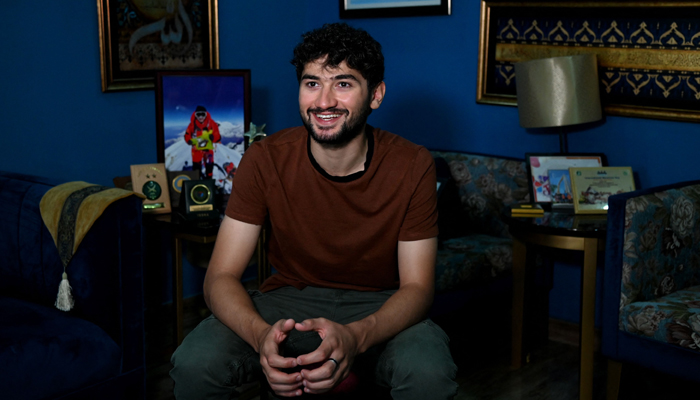
Kashif’s most dangerous climb was up the world’s ninth-highest peak, Nanga Parbat, in July 2022.
He and his climbing partner Fazal Ali got lost in bad weather after summiting, and soon ran out of oxygen, food and water.
“I started hallucinating,” Kashif said. “My head was working (but the) rest of my body was just totally numb.”

When Kashif woke from a rest, he was surprised to be alive, and determined to survive. After six hours of trekking, the pair made it to one of the mountain’s base camps.
“The thing that I was most afraid of (is) that I don’t want to die without knowing what my body is capable of.”
You may like
-
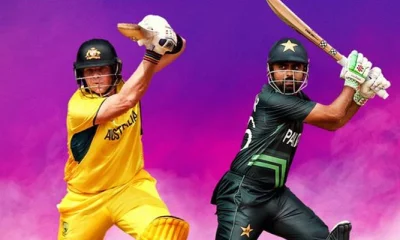

World Cup 2023: Pakistan opt to bowl first against Australia after winning toss
-


Good news: Fit-again Pakistan players practice ahead of Australia clash
-
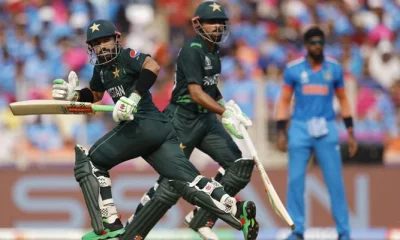

World Cup: Pakistanis believe Babar Azam, Mohammad Rizwan to be top run scorers
-


Four key India-Pakistan battles at World Cup
-
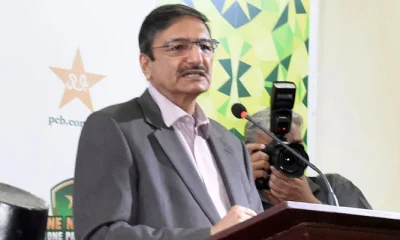

Pak vs Ind: PCB chief leaves for India tomorrow to watch World Cup blockbuster
-


Empty stadium trends as world’s biggest cricket ground fails to attract fans

In a unanimous verdict, a five-member bench of the Supreme Court on Monday declared civilians’ trials in military courts null and void as it admitted the petitions challenging the trial of civilians involved in the May 9 riots triggered by the arrest of Pakistan Tehreek-e-Insaf (PTI) chief Imran Khan in a corruption case.
The five-member apex court bench — headed by Justice Ijaz Ul Ahsan, and comprising Justice Munib Akhtar, Justice Yahya Afridi, Justice Sayyed Mazahar Ali Akbar Naqvi and Justice Ayesha Malik — heard the petitions filed by the PTI chief and others on Monday.
The larger bench in its short verdict ordered that 102 accused arrested under the Army Act be tried in the criminal court and ruled that the trial of any civilian if held in military court has been declared null and void.
The apex court had reserved the verdict earlier today after Attorney General of Pakistan (AGP) Mansoor Usman Awan completed his arguments centred around the domain and scope of the military courts to try the civilians under the Army Act.
At the outset of the hearing today, petitioner lawyer Salman Akram Raja told the bench that trials of civilians already commenced before the top court’s verdict in the matter.
Responding to this, Justice Ahsan said the method of conducting proceedings of the case would be settled after Attorney General of Pakistan (AGP) Mansoor Usman Awan completed his arguments.
Presenting his arguments, the AGP said he would explain to the court why a constitutional amendment was necessary to form military courts in 2015 to try the terrorists.
Responding to Justice Ahsan’s query, AGP Awan said the accused who were tried in military courts were local as well as foreign nationals.
He said the accused would be tried under Section 2 (1) (D) of the Official Secrets Act and a trial under the Army Act would fulfill all the requirements of a criminal case.
“The trial of the May 9 accused will be held in line with the procedure of a criminal court,” the AGP said.
The AGP said the 21st Amendment was passed because the terrorists did not fall in the ambit of the Army Act.
“Amendment was necessary for the trial of terrorists [then] why amendment not required for the civilians? At the time of the 21st constitutional amendment, did the accused attack the army or installations?” inquired Justice Ahsan.
AGP Awan replied that the 21st Amendment included a provision to try accused involved in attacking restricted areas.
“How do civilians come under the ambit of the Army Act?” Justice Ahsan asked the AGP.
Justice Malik asked AGP Awan to explain what does Article 8 of the Constitution say. “According to Article 8, legislation against fundamental rights cannot be sustained,” the AGP responded.
Justice Malik observed that the Army Act was enacted to establish discipline in the forces. “How can the law of discipline in the armed forces be applied to civilians?” she inquired.
The AGP responded by saying that discipline of the forces is an internal matter while obstructing armed forces from discharging duties is a separate issue.
He said any person facing the charges under the Army Act can be tried in military courts.
“The laws you [AGP] are referring to are related to army discipline,” Justice Ahsan said.
Justice Malik inquired whether the provision of fundamental rights be left to the will of Parliament.
“The Constitution ensures the provision of fundamental rights at all costs,” she added.
If the court opened this door then even a traffic signal violator will be deprived of his fundamental rights, Justice Malik said.
The AGP told the bench that court-martial is not an established court under Article 175 of the Constitution.
At which, Justice Ahsan said court martials are not under Article 175 but are courts established under the Constitution and Law.
After hearing the arguments, the bench reserved the verdict on the petitions.
A day earlier, the federal government informed the apex court that the military trials of civilians had already commenced.
After concluding the hearing, Justice Ahsan hinted at issuing a short order on the petitions.
The government told the court about the development related to trials in the military court in a miscellaneous application following orders of the top court on August 3, highlighting that at least 102 people were taken into custody due to their involvement in the attacks on military installations and establishments.
Suspects express confidence in mly courts
The same day, expressing their “faith and confidence” in military authorities, nine of the May 9 suspects — who are currently in army’s custody — moved the Supreme Court, seeking an order for their trial in the military court be proceeded and concluded expeditiously to “meet the ends of justice”.
Nine out of more than 100 suspects, who were in the army’s custody, filed their petitions in the apex court via an advocate-on-record.
The May 9 riots were triggered almost across the country after former prime minister Imran Khan’s — who was removed from office via a vote of no confidence in April last year — arrest in the £190 million settlement case. Hundreds of PTI workers and senior leaders were put behind bars for their involvement in violence and attacks on military installations.
Last hearing
In response to the move by the then-government and military to try the May 9 protestors in military courts, PTI Chairman Imran Khan, former chief justice Jawwad S Khawaja, lawyer Aitzaz Ahsan, and five civil society members, including Pakistan Institute of Labour Education and Research (Piler) Executive Director Karamat Ali, requested the apex court to declare the military trials “unconstitutional”.
The initial hearings were marred by objections on the bench formation and recusals by the judges. Eventually, the six-member bench heard the petitions.
However, in the last hearing on August 3, the then-chief justice Umar Ata Bandial said the apex court would stop the country’s army from resorting to any unconstitutional moves while hearing the pleas challenging the trial of civilians in military courts.
A six-member bench, led by the CJP and comprising Justice Ijaz Ul Ahsan, Justice Munib Akhtar, Justice Yahya Afridi, Justice Sayyed Mazahar Ali Akbar Naqvi, and Justice Ayesha Malik, heard the case.
In the last hearing, the case was adjourned indefinitely after the Attorney General for Pakistan (AGP) Mansoor Usman Awan assured the then CJP that the military trials would not proceed without informing the apex court.
Sports
World Cup 2023: Pakistan opt to bowl first against Australia after winning toss
Published
2 years agoon
By
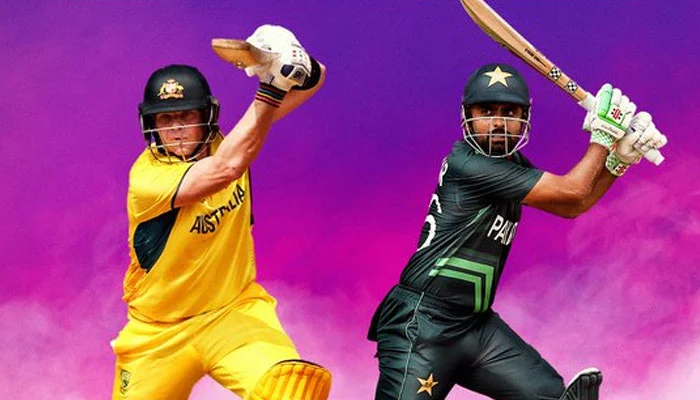
Pakistan has asked Australia to bat first after winning the toss in their fourth match of the ICC Men’s Cricket World Cup at the Chinnaswamy Stadium in India’s Bangalore on Friday (today).
Both the Green Shirts and Aussies are looking to clinch a victory, as both teams prepare to take on one another in the round-robin stage of the major cricket event.
The Babar Azam-led team has so far won two out of three total games played, while Pat Cummins side has only managed to secure one win out of its total three matches in the tournament.
For today’s match Pakistan have rested Shadab Khan and brought in Usama Mir as his replacement.
Playing XI
Pakistan: Abdullah Shafique, Imam-ul-Haq, Babar Azam (c), Mohammad Rizwan (wk), Saud Shakeel, Iftikhar Ahmed, Mohammad Nawaz, Usama Mir, Hasan Ali, Shaheen Afridi, Haris Rauf.
Australia: David Warner, Mitchell Marsh, Steven Smith, Marnus Labuschagne, Josh Inglis (wk), Glenn Maxwell, Marcus Stoinis, Mitchell Starc, Pat Cummins (capt), Adam Zampa, Josh Hazlewood.
Pakistan
PCB ‘dismisses’ objections over players support for Palestinians
Published
2 years agoon
By
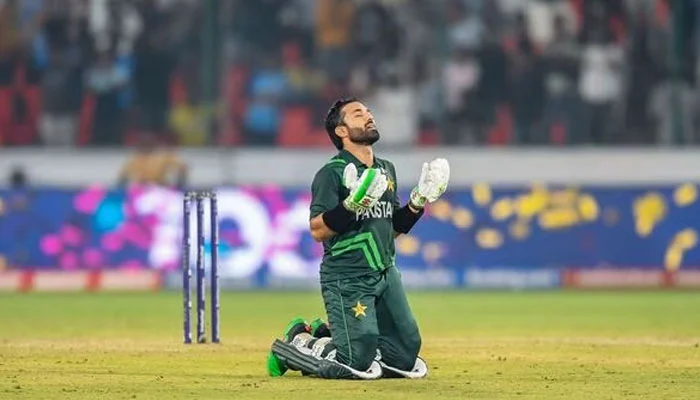
LAHORE: Pakistan’s cricket team, which is currently busy participating in the ICC Men’s T20 Cricket World Cup, has shown their firm support and shared their prayers for all Palestinians suffering at the hands of Israel.
However, there have been many questions raised by Indian fans and cricket experts on the players’ constant support for Palestine asking ICC — the governing body of the game — whether such moves were allowed in the tournament.
According to sources, the Pakistan Cricket Board (PCB) rejected the objections over players’ conduct saying: “The team’s expression of solidarity was a personal decision.”
Pakistan’s national team on Wednesday, posted a picture of the Palestinian flag on their individual X, formerly known as Twitter, accounts to show that they stand in solidarity with Palestine and that they are praying for the people suffering there including children.
☮️ ☮️ ☮️ ☮️ pic.twitter.com/r8E31Jsfya
— Shadab Khan (@76Shadabkhan) October 18, 2023
— Haris Rauf (@HarisRauf14) October 18, 2023
🤲🤲🤲🤲 pic.twitter.com/2hH4Gjmyhn
— Muhammad Nawaz (@mnawaz94) October 18, 2023
Prior to this Pakistan’s wicket-keeper batsman, Mohammad Rizwan, dedicated the team’s victory over Sri Lanka to his “brothers and sisters in Gaza”.
This was for our brothers and sisters in Gaza. 🤲🏼
— Muhammad Rizwan (@iMRizwanPak) October 11, 2023
Happy to contribute in the win. Credits to the whole team and especially Abdullah Shafique and Hassan Ali for making it easier.
Extremely grateful to the people of Hyderabad for the amazing hospitality and support throughout.
Meanwhile, Indian fans and cricket experts used the team’s support for Palestine to create controversies, claiming that the national team had violated ICC rules.
Sources from PCB added that the team is “allowed to express whatever they wanted to,” and that the players “did not violate any code of conduct by the ICC or PCB”.
The Health Ministry in Gaza reports that at least 3,061 Palestinians have died and over 13,750 more have been injured as a result of Israel’s shelling.
Pakistan has categorically condemned the Israeli atrocities and called for an immediate cessation of the bombardment, which has not even spared hospitals or schools, in solidarity with its Palestinian brothers and sisters.
Even Pakistani cricket legends who are not participating in the team anymore showed their support for Palestine.
🤲🏻🤲🏻 pic.twitter.com/8i20CX2Hka
— Kamran Akmal (@KamiAkmal23) October 18, 2023
#FreePalestine pic.twitter.com/IHC74YsxQH
— Zia Ul Haq (@zuh_leftarmfast) October 18, 2023
Moreover, Pakistan is set to face Australia tomorrow (Friday) in M Chinnaswamy Stadium, Bengaluru after a few days of rest.


Supreme Court annuls trials of civilians in military courts

Sea conditions ‘very high’ as Cyclone Tej moves towards northwestward

IMF condition: ECC set to green light gas tariff hike today

Barwaan Khiladi: Kinza Hashmi discusses her role as Alia

Snap launches tools for parents to monitor teens’ contacts

WATCH: Pakistani traveller deported from Dubai for damaging plane mid-air

Learn First | How to Create Amazon Seller Account in Pakistan – Step by Step

Sajjad Jani Funny Mushaira | Funny Poetry On Cars🚗 | Funny Videos | Sajjad Jani Official Team

